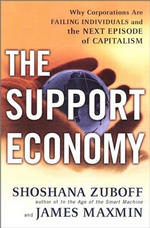| Saturday, December 21, 2002 |  |
|
|
|
 While discussing xpertweb, an interesting system for connecting people with experts through a peer economy, Britt Blaser mentions, amongst several problems with real-world reputation systems: While discussing xpertweb, an interesting system for connecting people with experts through a peer economy, Britt Blaser mentions, amongst several problems with real-world reputation systems:"People no longer work for a living. They hold jobs for a living, which pays better. ..which sort of got me thinking. That isn't just a flippant thing to say. I have a hard time thinking of anybody who really works for a living. When I have work that needs doing, I have a hard time finding anybody who would like to do it, even for money. And, I must admit, I don't really have time to work either. There's nothing I'm available for that you can just come and pay me for and I'll do it. And, looking around me, a lot of people seem to work that way. OK, I can still go and get a haircut and pay for it, and I pretty much know what I'll get. But that kind of thing is becoming more rare.
The times I have been employed by corporations I was always puzzled by the fact that most people weren't really doing anything terribly productive, and it made relatively little difference what amount of work people actually were putting out. I several times had the task of making a computer system that would automate what a certain company was doing, so I specifically had to study what it was that actually took place. And along the way I noticed how rather little it had to do with doing work and accomplishing finished work. For example, it is with some embarrassment I note that I once hired a guy to document a program I had written. He had an impressive resume, and the company had to pay above the norm to acquire him. After a year he left to join a big consulting company, and everybody shook his hand and congratulated him on his great career move and his excellent service to the company. I and everybody else knew, at least via our peripheral vision, that the tangible product of his 1 year of work was 1/2 written page of a suggested outline for the manual. We're talking about an expense of maybe $70K for 1/2 page of writing, which I could just as well have jotted down in five minutes instead of hiring him. But nobody cared, because none of it really matters that much. The company was busy and the organizational chart looked good and the money flowed somehow. And this guy had great relationships with everybody. He was very supportive. I enjoyed working with him.
It is not all crazy. The point is that it is relationships people want, rather than giving or receiving quantities of work. And in some mysterious way, that's actually working. With the people I work for today, I'm an independent contractor, but I've insisted on arrangements where I get paid fixed amounts of dollars per month, but I don't promise any hours of work, and there are no deadlines or anything like it. If they or I are unhappy, we'll change the amount or stop the agreement. But it is not about work. It is about paying attention. It is about being present for whatever comes along in a certain area.
I have not yet myself learned to be comfortable with that in situations where I'm the person who's needs some work done. I can see how it ought to work, but it just hasn't become intuitive yet for me. The point is of course that it needs to be a mutually beneficial relationship. I pay attention to these things, and you pay attention to those things, and together we're better off somehow. It is not about me forcing you to deliver certain goods at a certain price. The world is changing rapidly and the future is uncertain, so maybe the relationship model is more viable than a transaction model. But, of course, it needs to be a good relationship, not a bad one.
[ Organization | 2002-12-21 23:59 | | PermaLink ] More >
|
|
|
|
 The Publishers Weekly review of the book "The Support Economy: Why Corporations Are Failing Individuals and The Next Episode of Capitalism" says: The Publishers Weekly review of the book "The Support Economy: Why Corporations Are Failing Individuals and The Next Episode of Capitalism" says:"Over the last two centuries, they argue, an increasingly efficient economy, coupled with a rise in democratic thinking and growing access to information, has opened up life's possibilities to increasing numbers of people. Because participation in the consumption-based economy is unavoidable, the general public looks to markets to provide 'deep support' in their quest for individualization, but 'are routinely punished for being complex psychological individuals in a world still fitted out for the old mass order.' This macroeconomic structure treats people as either employees or consumers and inevitably hurts their feelings. Zuboff and Maxmin would eliminate the 'little murders' of customer service interaction by replacing the current transaction-based model with a form of 'distributed capitalism' based on a customer-supplier relationship, so semi-anonymous customer service reps will be replaced by 'advocates' fully emotionally involved in their clients' needs." I like that. Its gotta happen. The economic value of actually caring about giving people what they want - it must somehow turn out to be higher than the value of tricking or mistreating people into paying too much for things they don't really want. Sooner or later.
[ Organization | 2002-12-21 23:59 | | PermaLink ] More >
|
|
|
|
On the xpertweb site you find a manifesto aimed at providing "Value Chains for the Rest of Us". To explain:"Value Chains are the means by which originators get rich in a market economy — they are combinations of producers, distributors, middlepeople and retailers.
Value Chains have always been hard to forge, defend, manage and collect from, which is why they're so profitable. The Internet is poised to combine productive individuals into value chains which reward their participants as richly as traditional value chains." OK, I get it. Anyway, read the actual document. Much good stuff like:"The Internet is a conversation.
And that Markets are conversations, as described by the folks at ClueTrain.
Work and its Reward is primarily a conversation about quality: money is just the punch line.
The quality of the work-reward conversation, not money, is the best benchmark for a 'New' Economy.
Internet protocols are the best model for a quality-based, more even-handed Economic Operating System.
Establishing a quality-based Economic OS requires no new laws, technical standards or protocols, so it needs nobody's permission..."
[ Organization | 2002-12-21 23:59 | 0 comments | PermaLink ]
|
|
|
|
Andrius Kulikauskas and David Ellison-Bey have many thoughts in this paper about economies based on giving.
"Wealth is relationships. In what sense is this true? If you have relationships, then you can get a loan, an education, a job, timely ideas, opportunities. Whereas knowledge is worthless out of context. Even money is worthless if there is nobody to take it, that is, if there is no web of relationships to back up the currency.
If you are poor, then you lack relationships, you must be 'out of the loop'. But if we can bring you 'into the loop', help you form social connections, integrate you into the economy, then we are creating wealth. This suggests that a business might sustain itself, fight poverty and create wealth by integrating people into the economy...
[ Organization | 2002-12-21 23:59 | | PermaLink ] More >
|
|
 While discussing xpertweb, an interesting system for connecting people with experts through a peer economy, Britt Blaser mentions, amongst several problems with real-world reputation systems:
While discussing xpertweb, an interesting system for connecting people with experts through a peer economy, Britt Blaser mentions, amongst several problems with real-world reputation systems: The Publishers Weekly review of the book "The Support Economy: Why Corporations Are Failing Individuals and The Next Episode of Capitalism" says:
The Publishers Weekly review of the book "The Support Economy: Why Corporations Are Failing Individuals and The Next Episode of Capitalism" says: